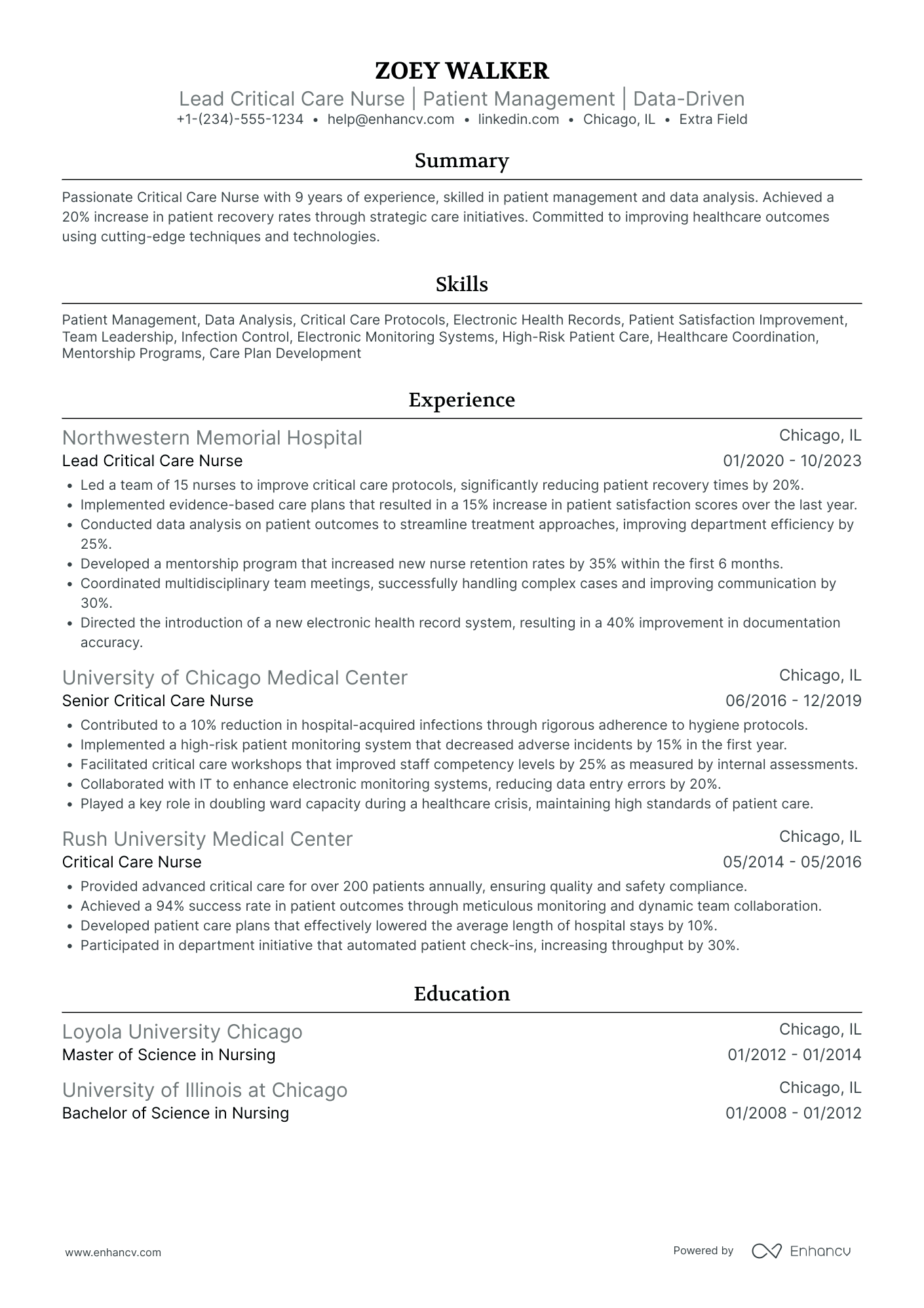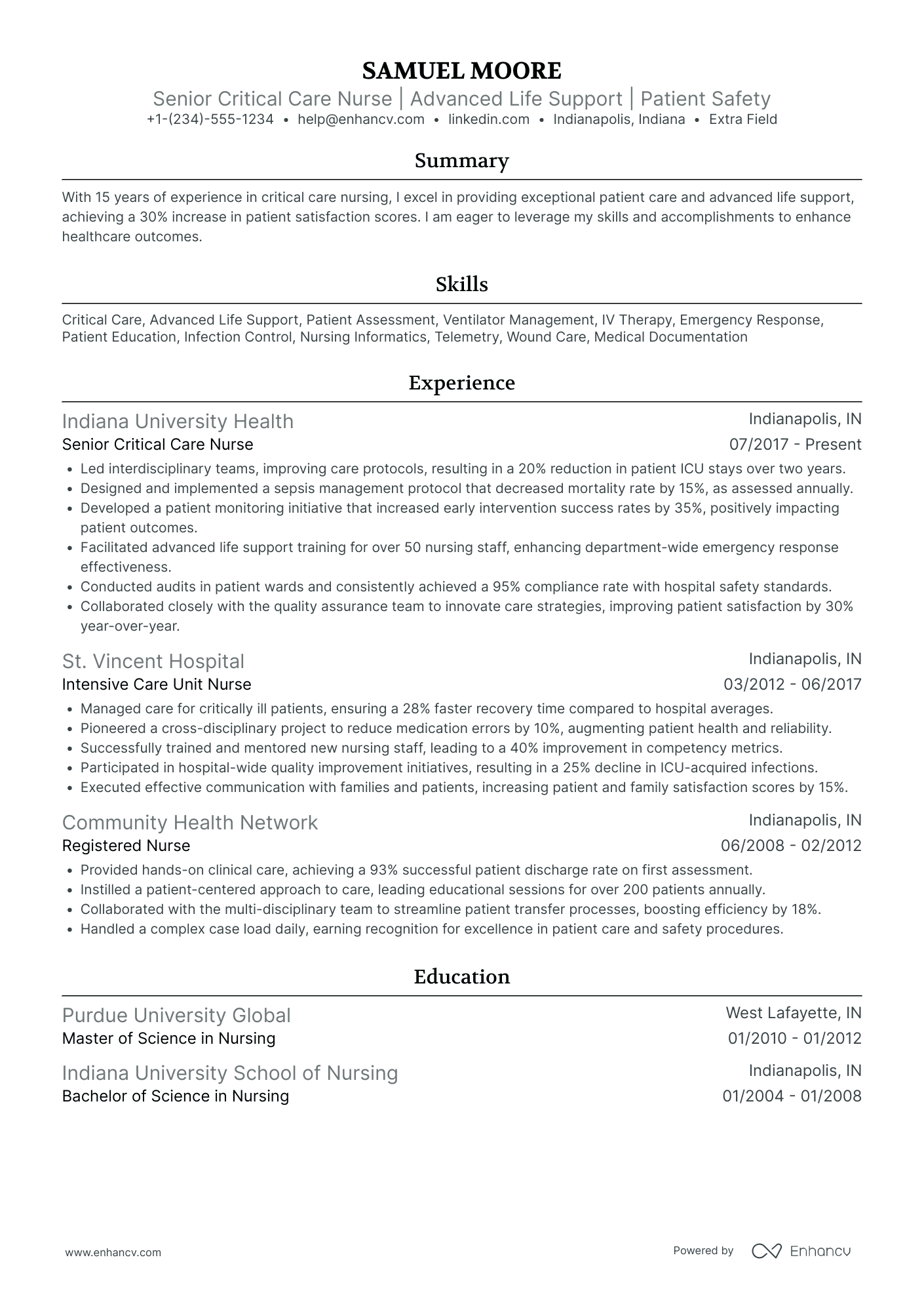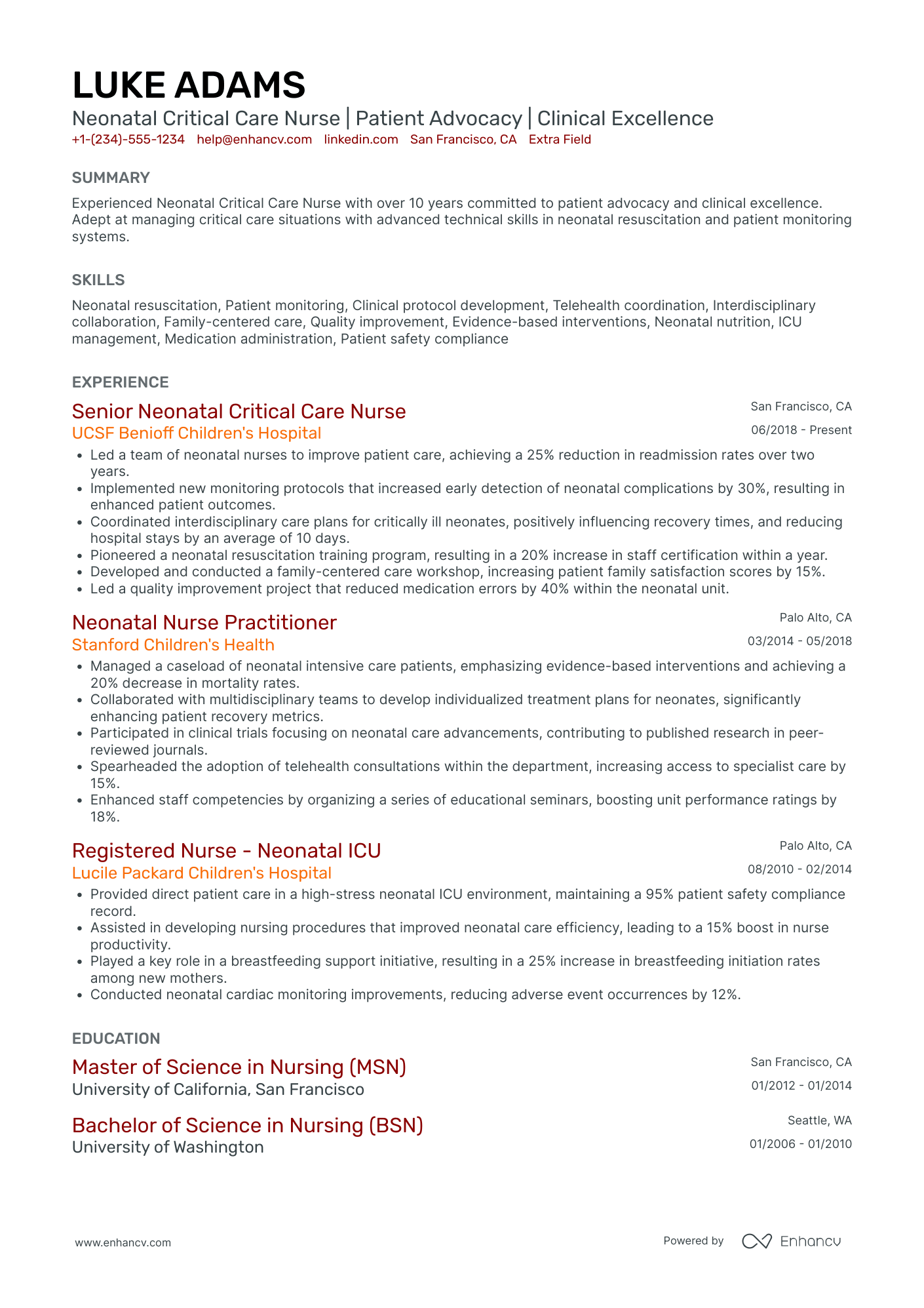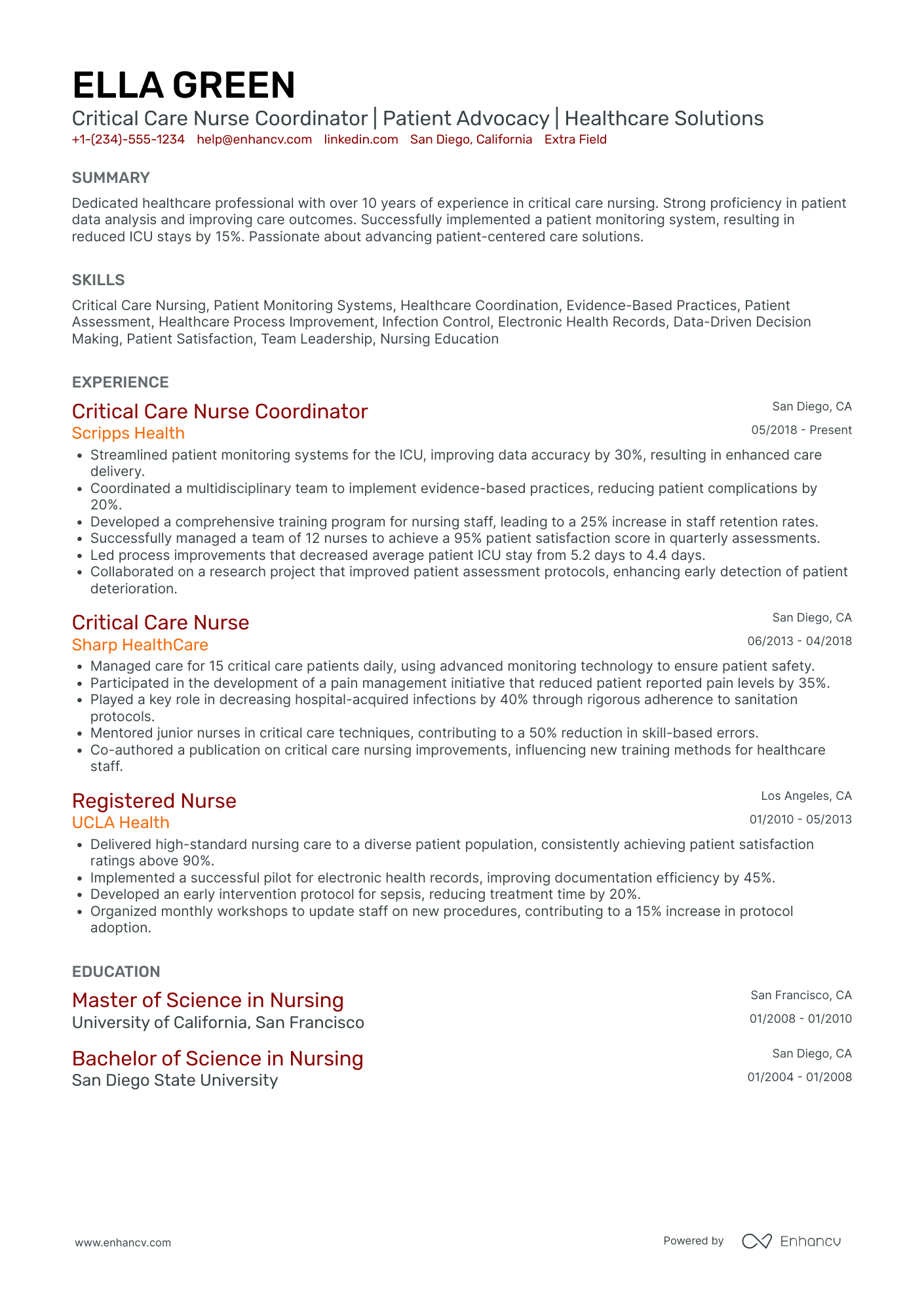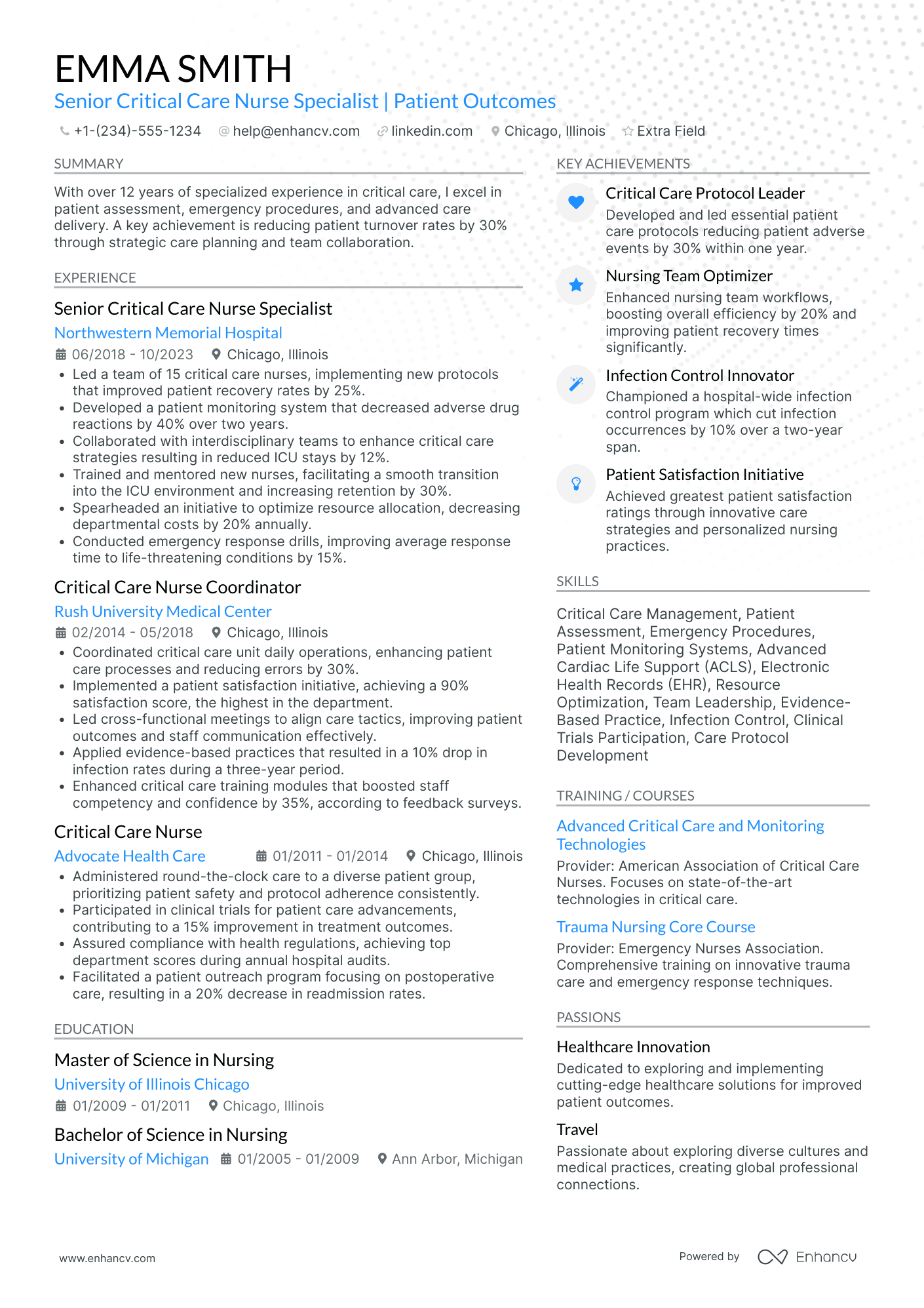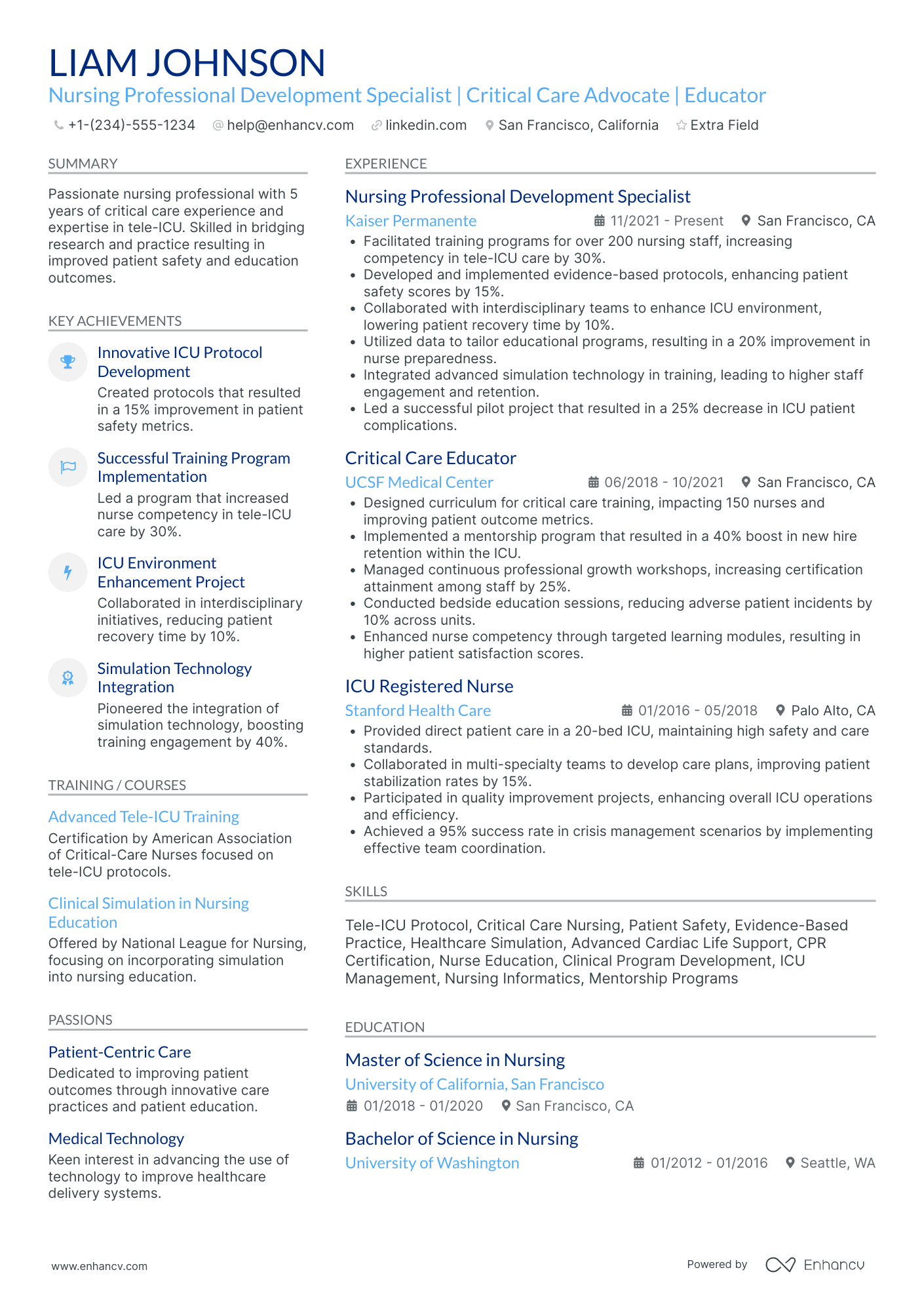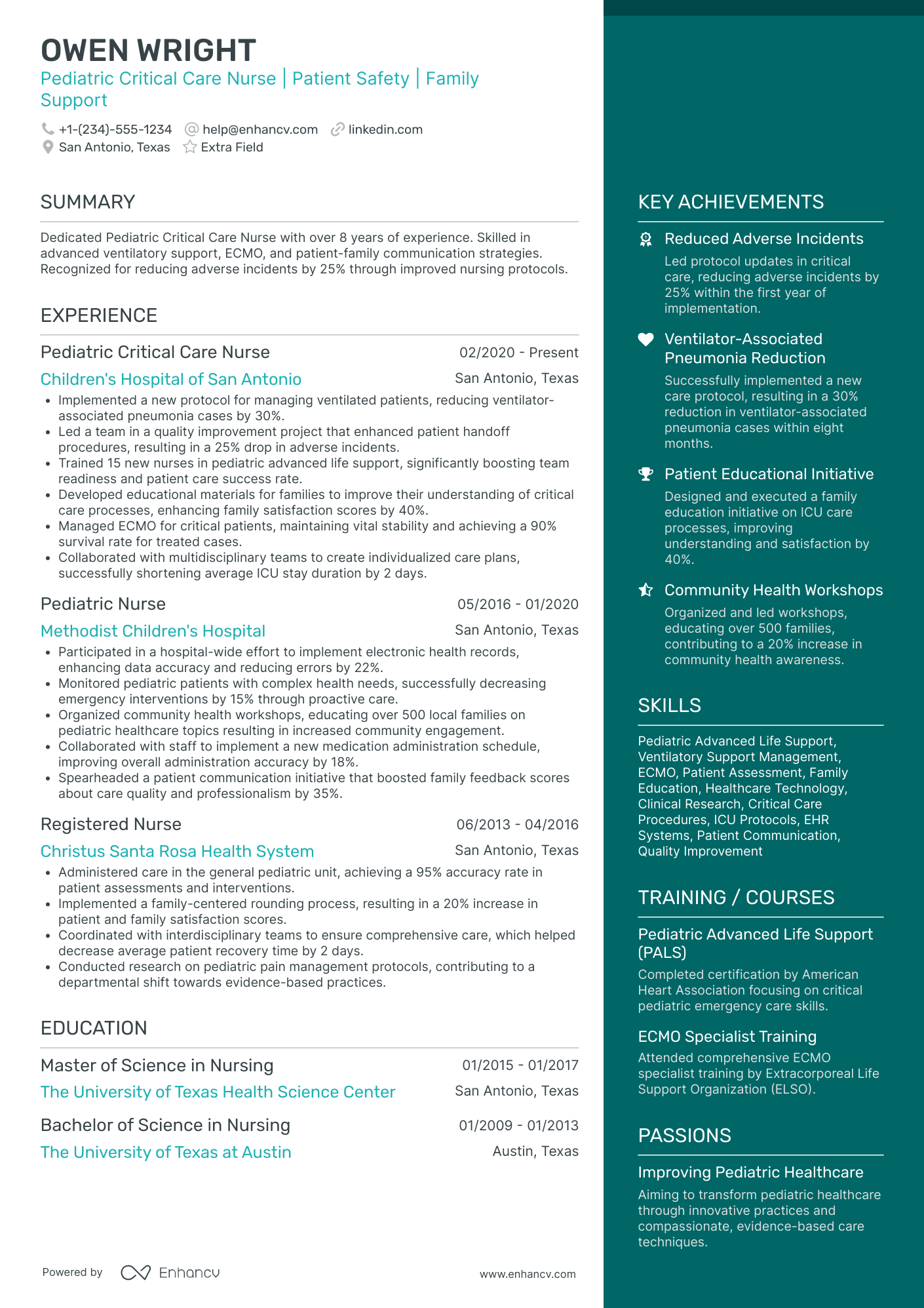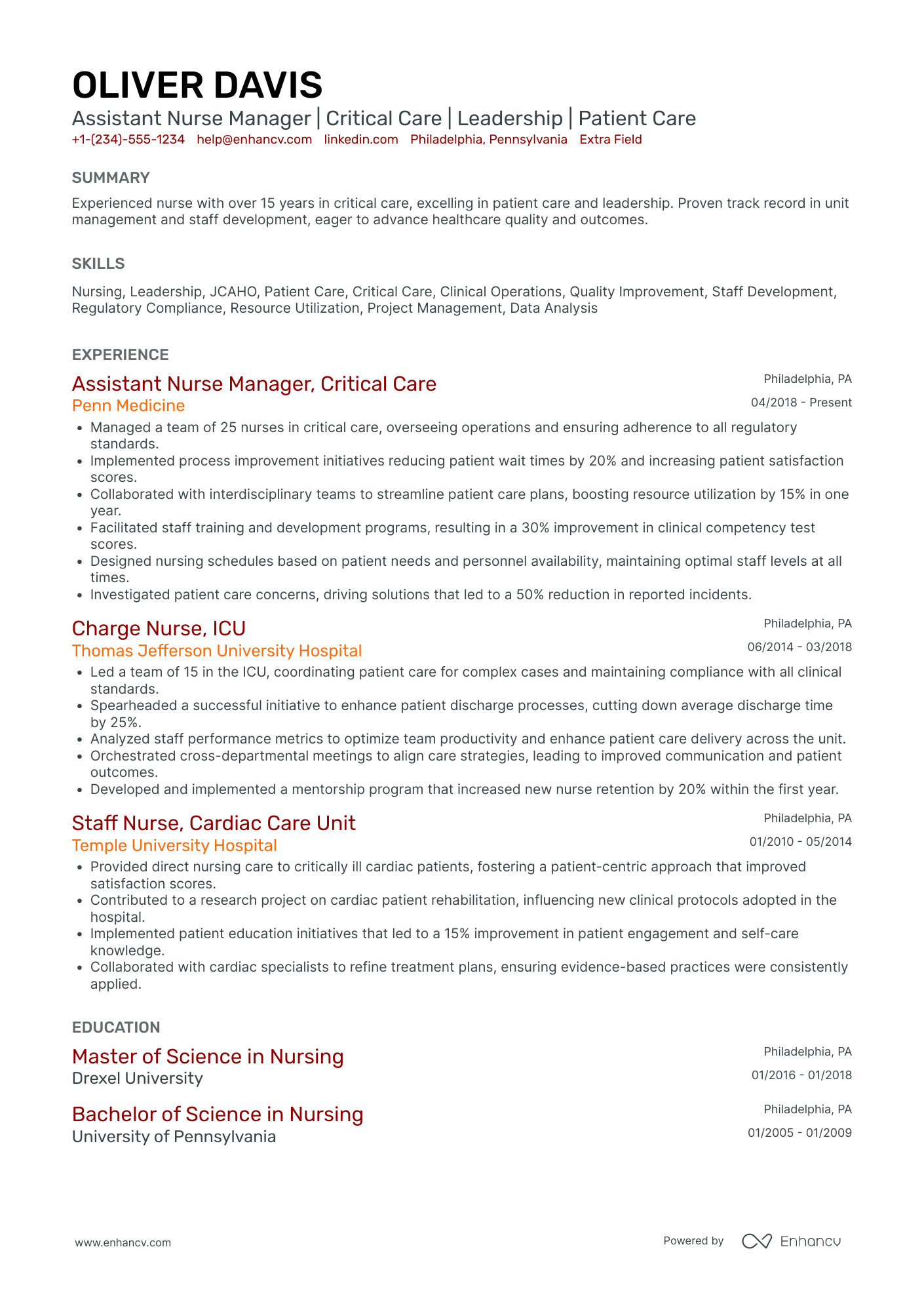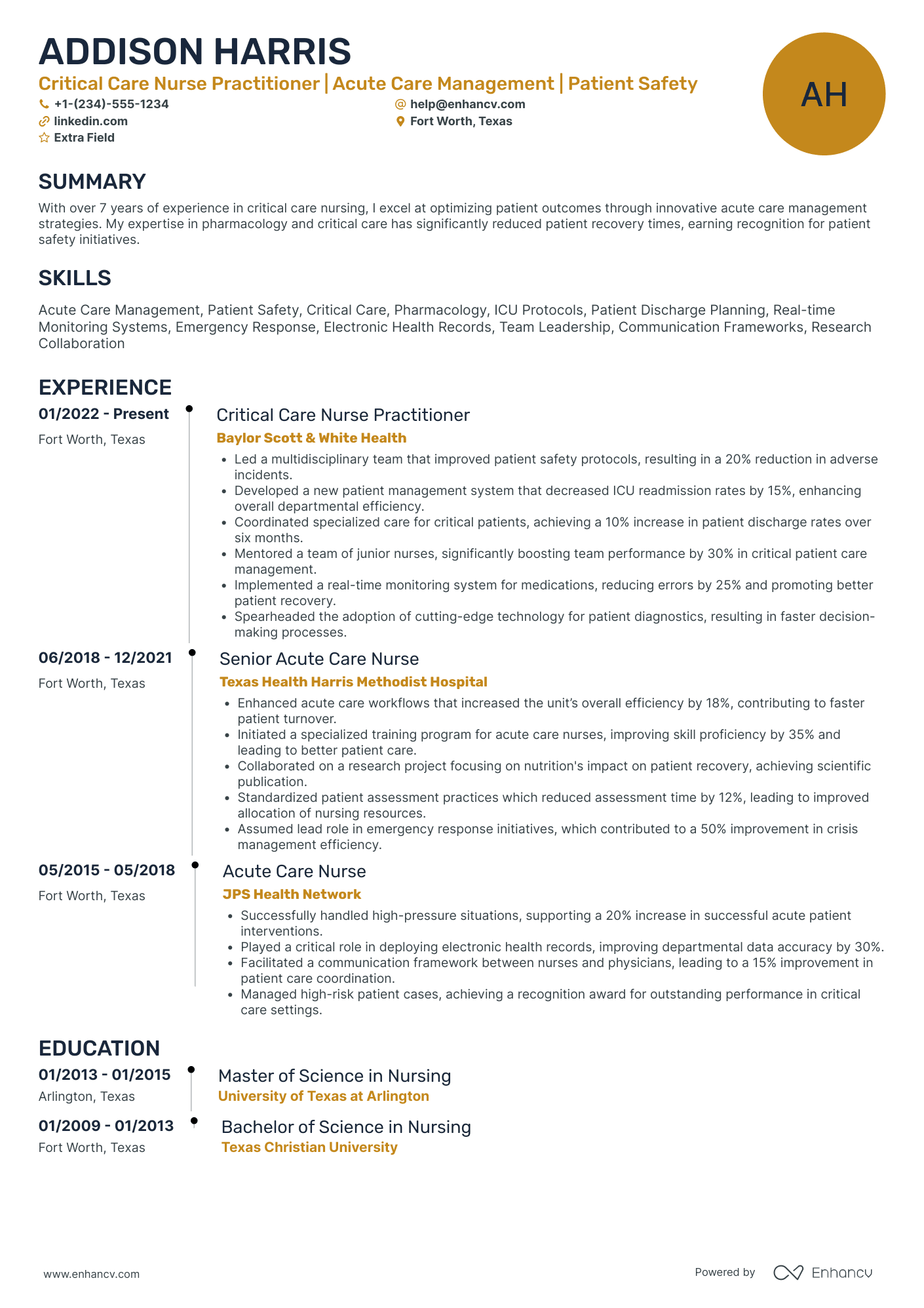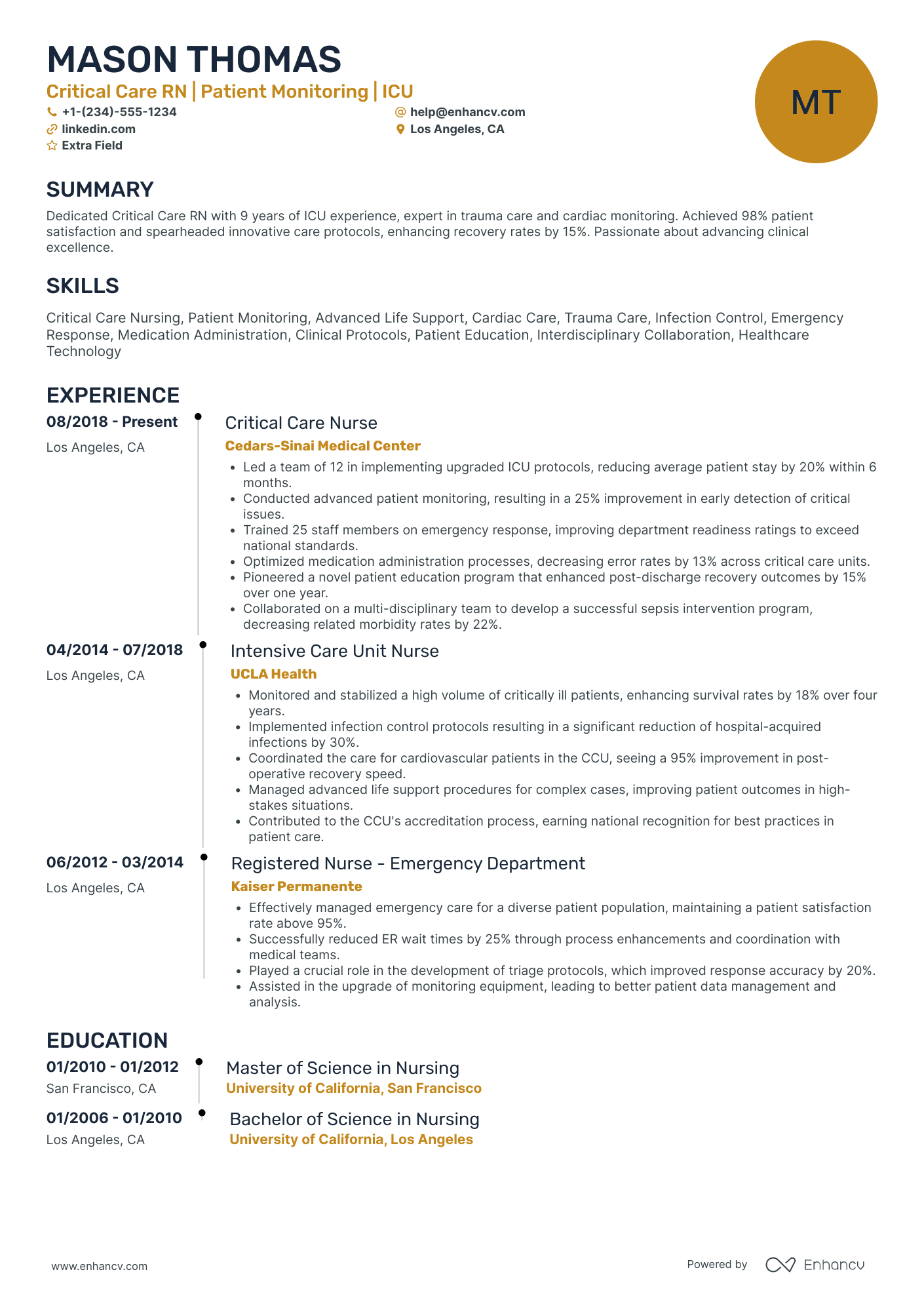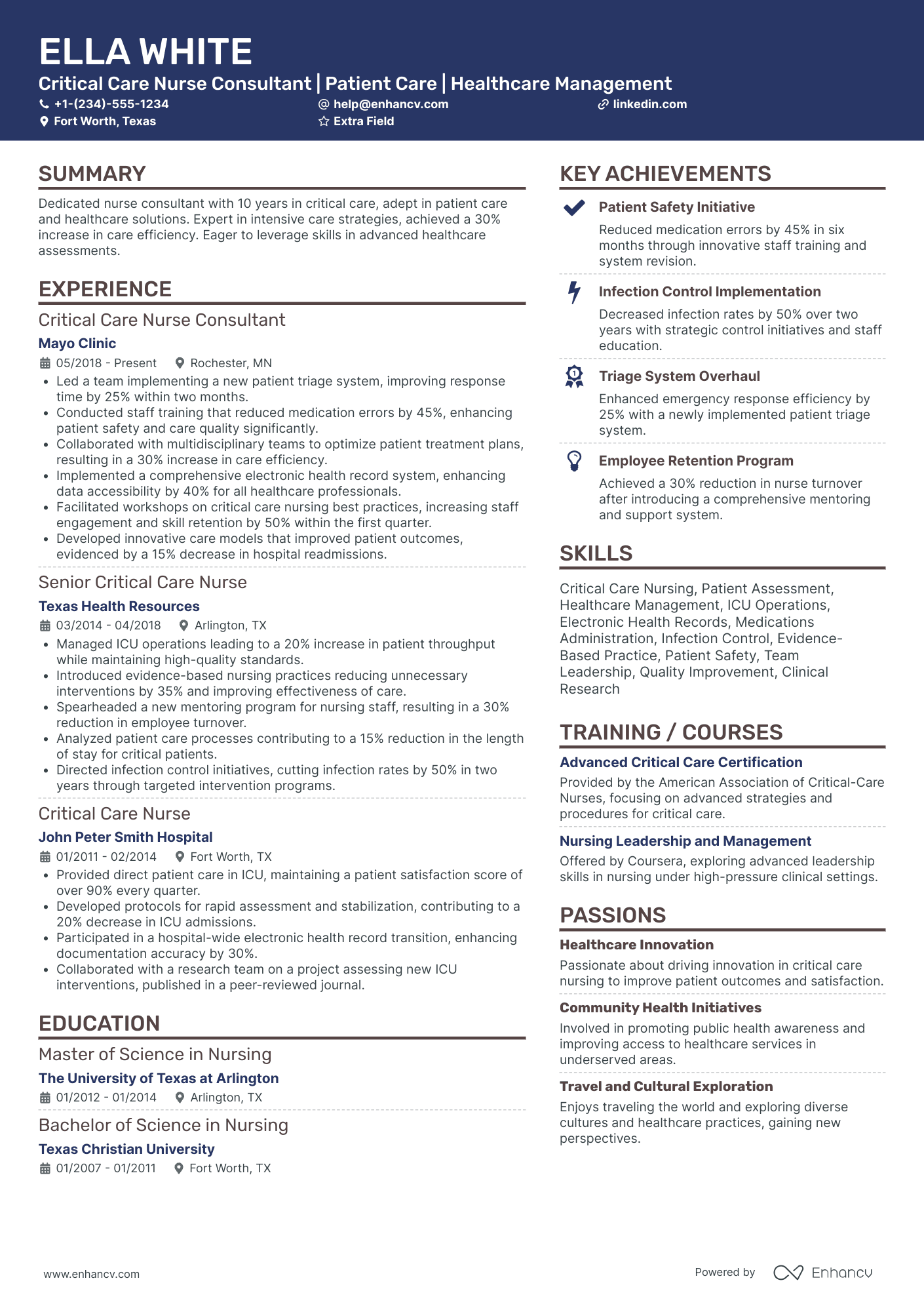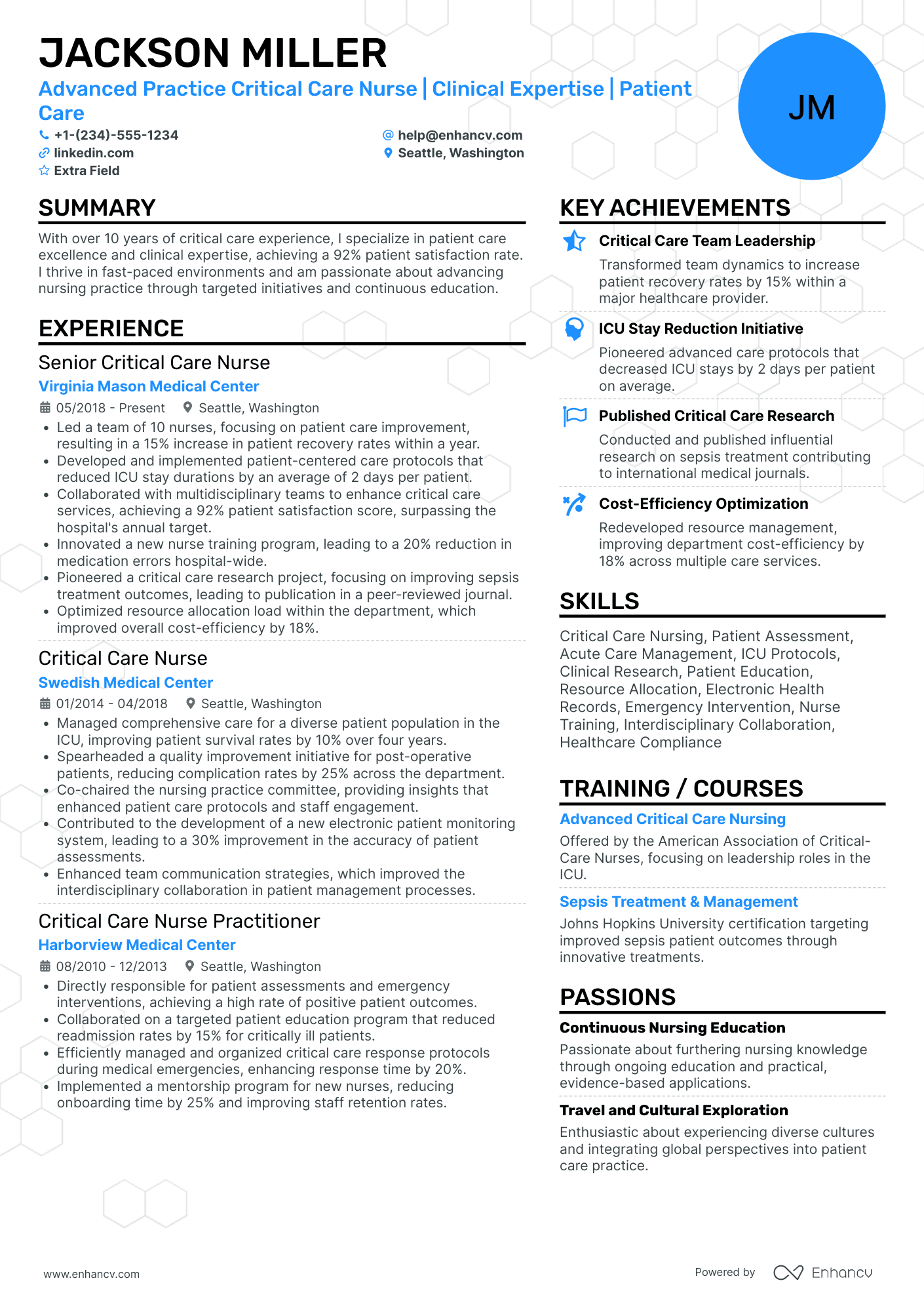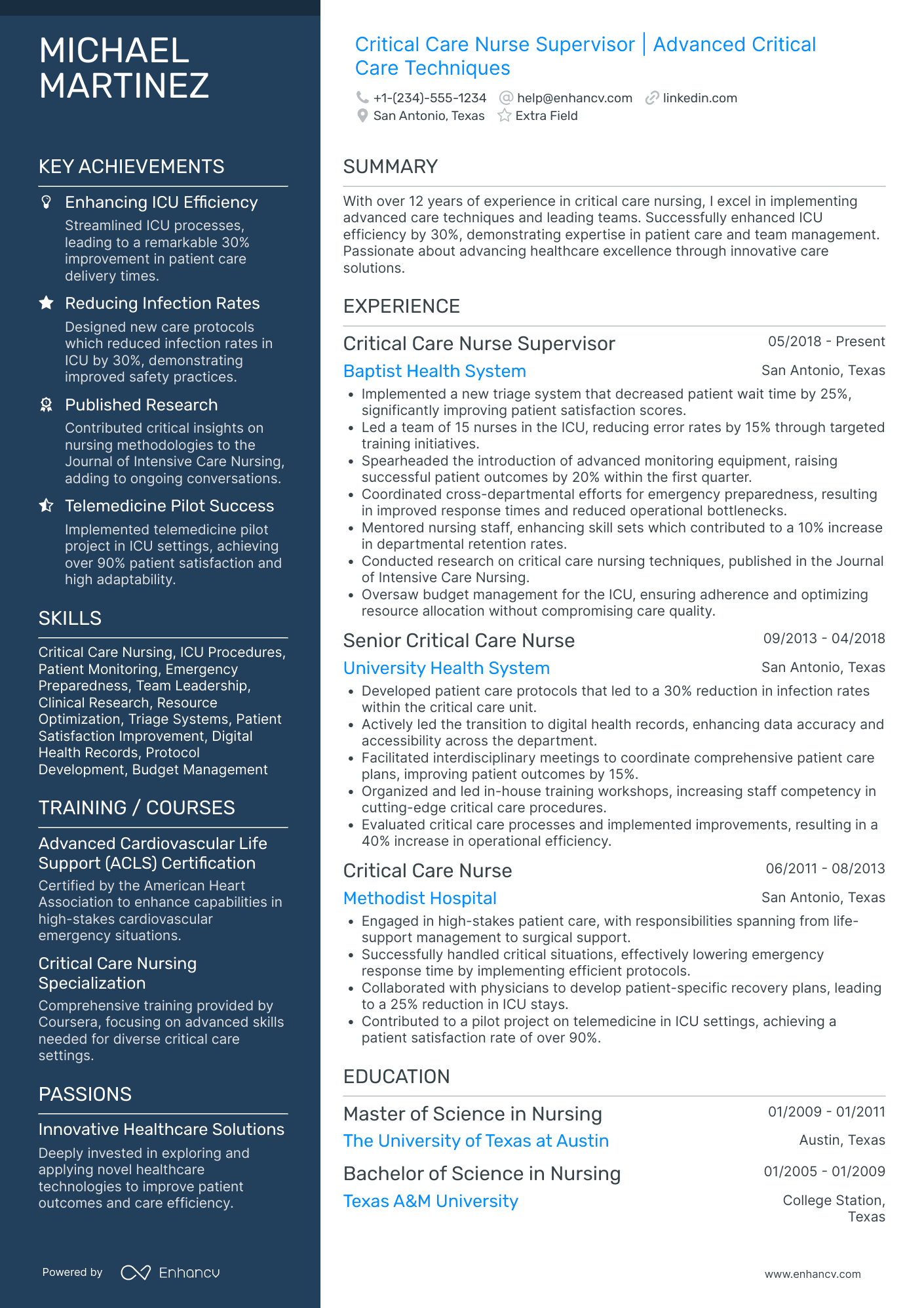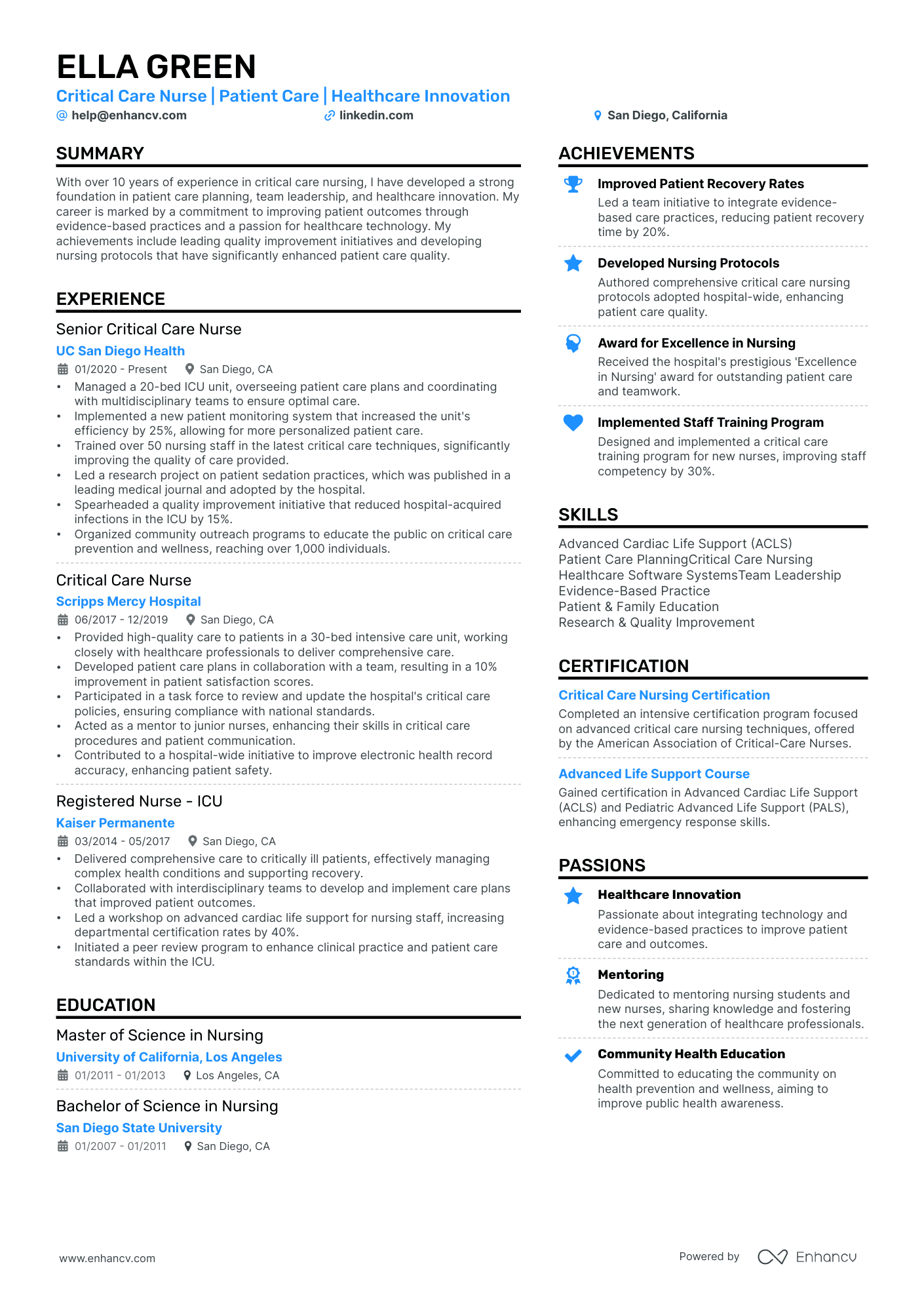Employment of registered critical care nurses is projected to grow 6% from 2022 to 2032, faster than the average for all occupations according to US Bureau of Labor Statistics. So yes, definitely this profession is in demand and the critical care nurse job market is wide open for candidates.
If you're a critical care nurse, it's certainly not uncommon to fight with the thought "Patients often transition to palliative care later than ideal, leaving me feeling as though I'm causing them more harm than good."
Though the role is undeniably exhausting on both a physical and emotional level, at your core, you recognize its value.
You can be sure that this job will never be boring or at least it won't be often. Admittedly, this role offers a consistently engaging and diverse experience, rarely monotonous. It includes its share of challenges and tough times, yet it is ultimately fulfilling and rewarding professionally.
Keep in mind that a critical care nurse's resume requires a specialized format and criteria. On our website, you can find different appropriate resume templates that will help you stand out.
Your resume must clearly demonstrate your extensive range of skills, emphasizing your patient-centered care, evidence-based practice, and a mix of compassion with clinical expertise.
So, how can you achieve that? See how, along with more, in this guide:
- What should be the central focus of your critical care nurse resume
- How to craft an impactful professional summary tailored to nursing
- What experiences you should highlight according to an experienced critical care nurse
- How to make your resume stand out to recruiters in healthcare
- Which skills are essential to include on your resume
Searching for similar resumes and guides? We got you covered:
If these examples provide useful guidance, be sure to incorporate them into your resume. Now, let's explore the effective strategies employed in critical care nursing resumes.
Critical Care Nurse resume Example
Here's what this applicant does well in their resume:
- Leadership and Innovation: The applicant demonstrates leadership by managing ICU units, leading quality improvement initiatives, and developing nursing protocols, highlighting their ability to drive positive changes in healthcare settings.
- Education and Certifications: The resume showcases a strong educational background with a Master of Science in Nursing and critical care nursing certification, emphasizing the applicant's specialized knowledge and commitment to professional development.
- Achievements and Impact: Specific achievements, such as implementing a new patient monitoring system and leading research projects published in medical journals, are highlighted to illustrate the applicant's direct impact on patient care and hospital operations.
- The right format is key to showcasing this important information about you. Continue to find out the steps to achieve it.
This important information about you needs the right format to be shown effectively. Continue reading to find out how to achieve this.
How to Format a Critical Care Nurse Resume
Your critical care nurse resume should effectively showcase your clinical skills, empathy, and extensive experience, enabling employers to quickly understand your qualifications.
Emphasize what sets you apart in nursing care.
Here are essential tips to make your resume stand out:
- Optimal File Type: Opt for a PDF format to ensure your critical care resume maintains its layout across all devices, protects your information, preserves the intended design, guarantees compatibility across platforms, and keeps the file size manageable for easy sharing.
- Resume Length: Keep your resume concise, ideally 1-2 pages, to succinctly present your qualifications without overwhelming recruiters in the healthcare industry.
- Reverse Chronological Format: List your most recent job experiences at the top to highlight your progression in the nursing field, showcasing your journey from entry-level positions to more significant roles.
- Accurate Contact Information: It's vital to include correct contact details on your resume. Use your legal name for straightforward background checks, a professional email address, a reliable phone number for direct contact, and your current city and state to indicate location availability. Proper contact information leaves a positive impression and enhances your chances of landing the critical care nurse job.
- Ideal Resume Font: Choosing the right font is crucial for making a good first impression and ensuring your resume is easy to read. Fonts like Lato, Rubik, and Montserrat are modern and professional, mirroring the dedicated nature of a critical care nurse.
Consider the local standards – Canadian resumes, for example, may have a different format.
If your critical care nurse resume appears to be behind the times, take advantage of our free and fast AI resume checker to update it. This service undertakes 16 key inspections to confirm that your resume is primed for triumph and to help increase your interview invitations.
Ensure you comply with these formatting guidelines to effectively highlight the key sections of your critical care nurse resume.
Wondering what these key sections are?
Let's dive in and explore them!
The top sections on a growth marketing resume:
- Summary: This is immensely important as it provides the basic information about you, ensuring that recruiters can contact you for interviews or job offers.
- Work experience in critical care: It is crucial to highlight this as it displays your competency in handling critical care nursing roles, showing your practical skills, and demonstrating your track record of work in the sector.
- Key skills: Highlighting key skills related to critical care nursing such as patient assessment, operation of medical equipment, or emergency response provides the recruiter with insight into the capabilities you bring to the role and how well-equipped you are for the job.
- Certifications: Specific to critical care nursing, recruiters look for specialized training and certifications such as Advanced Cardiovascular Life Support (ACLS) or Critical Care Registered Nurse (CCRN) certification which underline your competence and commitment to this nursing specialty.
If you're concerned that your resume might be too lengthy given your extensive experience, remember that a 2-page resume is typically ideal for individuals with many years of experience in the nursing field. If you exceed this length, it's advisable to shorten your resume.
Strive to focus on highlighting the qualifications and experiences that recruiters are specifically seeking in your critical care nurse resume.
Let's delve into the specifics.
What recruiters want to see on your resume:
- Advanced Life Support Certification: This is essential for a critical care nurse as it proves their proficiency in advanced resuscitation techniques and immediate post-cardiac arrest care.
- Years of Experience in a Critical Care Setting: This is prioritized to ensure the nurse is well accustomed to the fast-paced and high-stakes environment of critical care nursing.
- Ability to Stay Calm Under Pressure: This quality is a high priority as it demonstrates the ability to handle high-stress situations and make clear, sound decisions that could potentially save lives.
- Mastery of High-Tech Equipment: Due to the reliance on advanced life support systems in critical care, recruiters look for those proficient in operating and monitoring such machines.
- Effective Communication Skills: This is of great importance to facilitate smooth collaboration with other medical staff and to provide precise and empathetic communication with patients and their families.
Making a positive impression on recruiters is a vital step forward in the recruitment process. Focus on tailoring an experience section in your resume that is both brief and detailed, as this is one of the key areas they are looking carefully to understand your professional value.
Keep reading!
We will show you some good and bad practices.
How to Write the Experience Section for Your Critical Care Nurse Resume
In critical care nursing, the objective is to improve patient care quality. This focuses on crucial healthcare metrics such as higher recovery rates, shorter hospital stays, and greater patient satisfaction. Highlight the real-world impact you've had in your past critical care nursing roles, detailing specific improvements and outcomes.
We've observed many positive and negative examples in practice.
Let's begin by discussing what approaches to avoid.
- •Nursing strategies focused on enhancing patient care
- •Observation of different healthcare metrics
- •Regular collaboration with healthcare teams, family members, and external healthcare partners
- •Routine tasks in patient monitoring and documentation
Instead of simply enumerating previous responsibilities, emphasize how your interventions led to improvements in patient care and outcomes. The first experience section on the critical care nursing resume has some issues. Let's pinpoint what needs correction.
- Fails to detail actions' impact or outcomes.
- Omits how activities aid patient care or growth.
- Lacks quantifiable improvements or progress.
- •Implemented evidence-based nursing strategies, reducing patient recovery times by 20% and cutting hospital readmissions by 30% within a year.
- •Monitored healthcare metrics, achieving a 25% improvement in patient satisfaction scores and a 15% decrease in medication errors over six months.
- •Led cross-functional collaboration with healthcare teams, family members, and external partners, enhancing patient care coordination and support, resulting in a 40% increase in positive patient outcomes.
- •Streamlined patient monitoring and documentation processes, increasing efficiency by 35% and reducing paperwork turnaround time by 50%.
The transformation is striking, almost like we're looking at someone else's resume, right? That’s because this example:
- Clearly demonstrates the actual results of the work, making a person`s effectiveness and contributions easily measurable.
- Illustrates the ability to lead, innovate, and collaborate, essential qualities in healthcare.
- Sets the candidate apart from other applicants by quantifying the achievements.
- Makes the resume more noticeable and memorable to recruiters by clearly stating how the candidate has made a difference.
Emphasizing on your real work experience on a resume is the best way to produce a significant effect.
Regarding this, make sure that you are following the ATS common recommendations. What is ATS?
Let's explain.
An Applicant Tracking System (ATS) is a type of software used by employers during the hiring process. It helps to manage job applications and screen resumes electronically. The system is designed to scan resumes for specific keywords, skills, education, and other relevant information to determine whether a candidate matches the job requirements or not.
As a critical care nurse job seeker you need to optimize your resume to be ATS-friendly. Although ATS systems mainly don't filter out resumes for lacking specific keywords as of 2025, rejections often result from positions already being filled or other candidates being preferred.
Remember, all serif and sans-serif fonts, including Arial and Times New Roman, are suitable but too common. Instead, you can use fonts such as Rubik, Lato, and Raleway.
Feeling overwhelmed about including all vital details in your resume and determining what's crucial? Here is the moment to mention that Enhancv has professionally designed resume templates that are ATS compatible.
But let's go deeper into the topic.
How to quantify impact on your resume
For a critical care nurse, it's essential to demonstrate the measurable impact of your nursing interventions on patient outcomes and healthcare efficiency. Here are tailored recommendations:
- Include the number of beds in the critical care units you've worked in to show the scale of operations you are accustomed to handling.
- List the total number of patients handled per shift to demonstrate your capacity and efficiency as a critical care nurse.
- Highlight the percentage of patient recovery rates under your care to show the effectiveness of your practice.
- Mention the frequency of high-risk procedures you were involved in, indicating your experience with complex patient cases.
- Mention any process improvements or protocols you've implemented, along with the quantifiable benefits to the unit, displaying your initiative and value.
- State the number or percentage of emergency cases handled successfully to show your competency and calmness under pressure.
A quantifiable impact on your resume is crucial, but it's equally important to highlight both your soft and hard skills.
How to List Your Hard Skills and Soft Skills on Your Resume
llustrating your technical and interpersonal skills portrays a holistic view of your qualifications.
Continue reading to find out what skills a critical care nurse needs to be successful in the workplace.
Best hard skills for your critical care nurse resume
- Advanced Cardiovascular Life Support (ACLS) certification
- Basic Life Support (BLS)
- Cardiopulmonary Resuscitation (CPR)
- Pediatric Advanced Life Support (PALS) certification
- Intravenous (IV) therapy administration
- Intensive Care Unit (ICU) technical skills
- Interpretation of EKGs
- Use of mechanical ventilation equipment
- Defibrillator operation
- Operation of intracranial pressure monitoring systems
- Use of continuous renal replacement therapy (CRRT) machines
- Telemetry monitoring
- Use of Electronic Health Records (EHR) software
Best soft skills for your critical care nurse resume
- Empathy
- Stress management
- Active listening
- Effective communication
- Patience
- Detail-oriented
- Adaptability
- Problem-solving
- Teamwork
- Emotional resilience
- Time management
- Decision-making
- Strong work ethic
- Compassion
Adding relevant certifications to your resume is a strategic way to accent your skills, essential for any critical care nurse looking for a new job
How to List Your Certifications and Education on Your Resume
A resume for a critical care nurse isn't complete without a detailed education section and relevant certifications.
The education section is vital, displaying your foundational knowledge and specialized training in nursing.
Below is an excellent example of how to effectively present your educational background on your resume.
- •Specialized Coursework: Strategic product management, user experience design, and market analysis
- •Core Modules: Principles of marketing, product development and innovation, business analytics
Earning a degree in nursing or a related healthcare field demonstrates your dedication to understanding complex medical concepts. Each academic achievement convinces employers of your capability to handle high-stakes responsibilities in critical care settings.
Below is an ideal way to showcase your educational background and certifications on your resume.
Best certifications for your critical care nurse resume
Ensuring every part of your resume is detailed is important, but for a critical care nurse, a compelling summary is key to drawing recruiters' attention to the most vital aspects of your clinical experience.
How to Write Your Critical Care Nurse Resume Summary Or Objective
Begin your critical care nurse resume with a strong summary to grab recruiters' attention, emphasizing your nursing skills and experience.
Keep your summary concise, about three sentences, to swiftly highlight your critical care qualifications and align with job requirements, incorporating relevant keywords.
For those in critical care nursing, a summary is more effective than an objective, offering a snapshot of your professional journey and expertise.
Refer to our guide for crafting a compelling resume summary tailored to the critical care nurse role.
This summary is a poor example for several reasons:
- Vague language and lacks detail.
- No measurable achievements mentioned.
- Generic, undifferentiated descriptions.
- Omits specialized critical care nurse skills.
- Unclear career goals presented.
The summary stands out due to its:
- Specifies experience and environments clearly.
- Quantifiable achievements with percentages, timeframes.
- Highlights specialized CCN skills.
- Demonstrates effective team collaboration.
- Expresses a clear career advancement goal.
Optimize your resume summary and objective for ATS
Drop your resume here or choose a file.
PDF & DOCX only. Max 2MB file size.
Additional Sections for a Critical Care Nurse Resume
For critical care nursing positions, it's vital to emphasize your capabilities and successes.
Consider adding sections such as:
- Trainings: Display your dedication to specialized nursing skills and compliance with industry standards.
- Languages: Demonstrate your ability to communicate effectively in diverse healthcare settings, vital for a critical care nurse role.
- Strengths: Lets you highlight what you're best at and how it matches the needs of the critical care nursing job.
Key Takeaways
- Critical care nursing demand: The employment of registered critical care nurses is projected to grow 6% from 2022 to 2032, indicating a strong demand for this profession.
- Emotional and physical challenges: Despite the job's demanding nature, both emotionally and physically, the inherent value and impact on patient care are recognized by those in the field.
- Dynamic and rewarding work: The role promises a non-monotonous, challenging yet ultimately rewarding experience, with moments of intensity balanced by significant professional fulfillment.
- Specialized resume requirements: A critical care nurse's resume must keep to specific formats and criteria, emphasizing clinical skills, patient-centered care, and a blend of compassion with technical expertise.
- Strategic resume content: Effective resumes for critical care nurses should focus on quantifiable achievements, relevant skills, and tailored professional summaries to stand out to recruiters and healthcare employers.
Critical Care Nurse resume examples
By Experience
By Role
